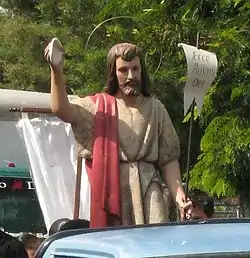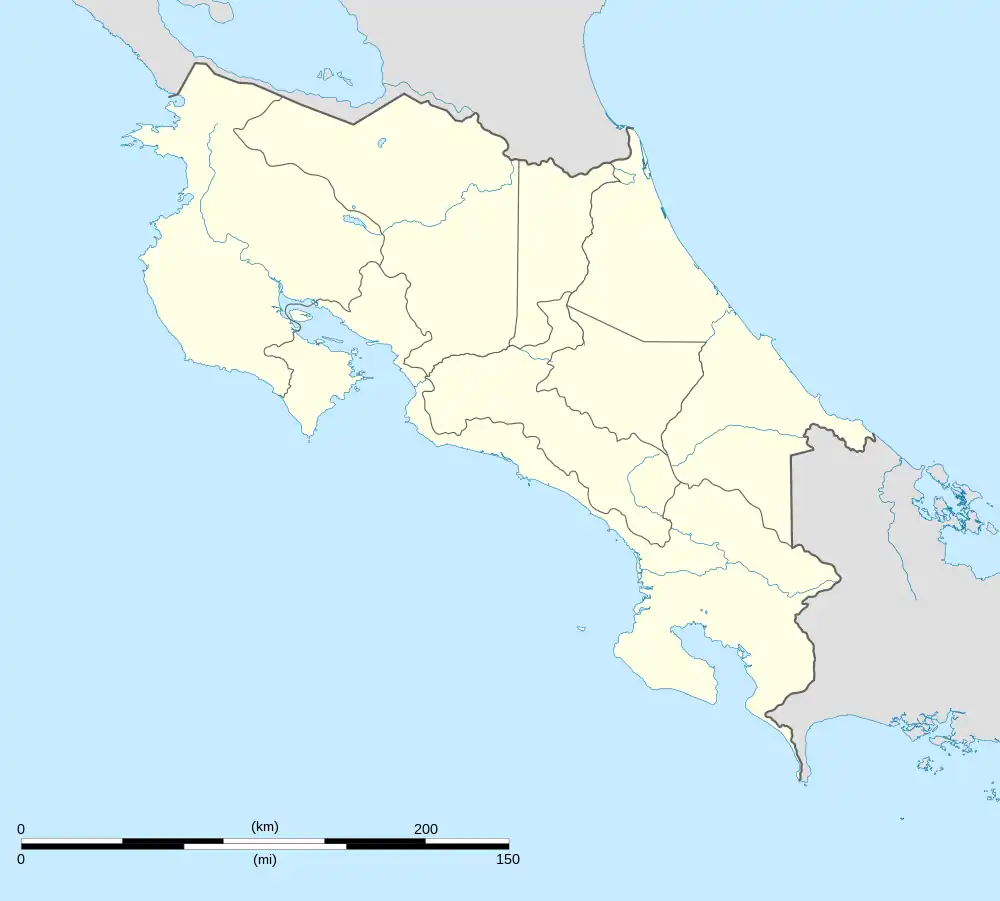Jesús | |
|---|---|
 Jesús de Santa Bárbara's ecclesiastical statue of Jesus | |
Jesús district | |
 Jesús Jesús district location in Costa Rica | |
| Coordinates: 10°03′17″N 84°08′27″W / 10.0548486°N 84.1408762°W | |
| Country | |
| Province | Heredia |
| Canton | Santa Bárbara |
| Area | |
| • Total | 11.18 km2 (4.32 sq mi) |
| Elevation | 1,160 m (3,810 ft) |
| Population (2011) | |
| • Total | 9,603 |
| • Density | 860/km2 (2,200/sq mi) |
| Demonym(s) | Vecino de Jesús, Jesúseño |
| Time zone | UTC−06:00 |
| Postal code | 40404 |
| Climate | Am |
Jesús, also called Barrio Jesús, is a district of the Santa Bárbara canton, in the Heredia province of Costa Rica.[1][2] The district consists of several large neighborhoods: Altagracia, Birrí, Catalina, Común, Cuesta Colorada, La Máquina, Guachipelines, Guaracha, and Ulises.
History
Like the rest of the canton, before the Spanish settlers came, Jesús was originally occupied by the Huetares, an indigenous tribe. The Huetare King, Cacique Garabito, dominated the area.[3]
In early 1663, settler Joseph de Sandoval Ocampo arrived in the region of Jesús in order to set up a cattle farm.[4] Heredia, Barva, and Alajuela, three neighboring cities, were populated and settled in the late 1700s. As trade increased between the three cities, the canton developed.[5]
Jesús officially became a district in the canton of Santa Bárbara on 7 December 1848.[6] This official recognition from the national government came when Santa Bárbara was declared the fourth canton of Heredia Province, thanks to the efforts of Gregorio Salazar.[3]
By 1852, resident Horacio Morales had successfully lobbied Jesúseños to construct a small chapel in the district.[5] By 1885, there were two public schools for children in Jesús.[5] One was for boys and one was for girls.[5]6 Jesús was one of the last of Santa Bárbara's districts to receive running water, sometime after 1911.[3] It was electrified in 1937.[5]
Geography and wildlife
Jesús has an area of 11.18 km2[7] and an elevation of 1,160 metres.[1]
Major neighborhoods include Calle Solís, Mitad Sur de la Cuesta Colorada (Lower Red Hill), Quebrada la Cruz (Cruz River), Urbanización Cifuentes, Calle de Trapiche, Rosa Blanca (White Rose), La Teofila, and Central Jesús.[6] In the northwest of the district are the neighborhoods of Birrí, La Catalina, La Cuesta Colorada (Red Hill), and San José de Altagracia.[6]
Like much of Costa Rica, the Comisión Nacional de Prevención de Riesgos (National Risk Prevention Commission) puts Jesús in a high-risk zone.[8] This is due to the district's mountainous geography, which can lead to landslides and flooding.[8] Several large rivers run through Jesús. These include Quebrada Burros, Quebrada Birrí, Río Porrosati, and Quebrada Cruz.[6]
Over 60 different species of birds have been observed in Jesús.[9]
Economy

The backbone of Jesús' economy is agricultural production, particularly coffee.[5] In 1973, 1,810 kilograms of coffee were produced in Jesús. In addition, Jesús is a major producer of sugarcane.[5] There is an active recycling group in the district.[6]
There are various commercial businesses in Jesús, including supermarkets, restaurants and corner stores.[10][11] There is also a developed tourist industry in the district, which includes Hotel Rosa Blanca, a small, luxury hotel.[12] Hotel Monte Campana, located in Birrí, includes ranches, swimming pools, and other activities.[13] Another hotel in the district is La Catalina.[14] There are businesses with stocked lakes and rivers for tourists interested in fishing.[15] In addition, Café Britt maintains a distribution center on Highway 128, west of central Jesus.[16]
Education and public services
An EBAIS, Equipo Básico de Atención Integral en Salud (Basic Medical Care Center), is located in Jesús, serving residents and non-residents of the district.[10] The Catholic Church serves the region through the Archdiocese of Alajuela.[17]
There are now three elementary schools in the district: Alfredo Volio Jiménez, located in Birrí, Alfredo González Flores, located on highway 126, and Escuela Jesús in central Jesús. Students from the district usually attend Colegio Santa Bárbara High School,[18] but may also go to the high schools in Barva or Heredia. Jesús is home to a private language school: The Amistad Institute. The Amistad Institute has a five-acre campus close to the center of Jesús.[19]
Demographics
| Historical population | |||
|---|---|---|---|
| Census | Pop. | %± | |
| 1883 | 636 | — | |
| 1892 | 690 | 8.5% | |
| 1927 | 837 | 21.3% | |
| 1950 | 945 | 12.9% | |
| 1963 | 1,556 | 64.7% | |
| 1973 | 2,144 | 37.8% | |
| 1984 | 3,717 | 73.4% | |
| 2000 | 7,585 | 104.1% | |
| 2011 | 9,603 | 26.6% | |
|
Instituto Nacional de Estadística y Censos[20] |
|||
For the 2011 census, Jesús had a population of 9,603 inhabitants. [22]
Transportation
Road transportation
The district is covered by the following road routes:
References
- 1 2 "Declara oficial para efectos administrativos, la aprobación de la División Territorial Administrativa de la República N°41548-MGP". Sistema Costarricense de Información Jurídica (in Spanish). 19 March 2019. Retrieved 26 September 2020.
- ↑ División Territorial Administrativa de la República de Costa Rica (PDF) (in Spanish). Editorial Digital de la Imprenta Nacional. 8 March 2017. ISBN 978-9977-58-477-5.
- 1 2 3 "Reseña Histórica del Cantón". Municipalidad de Santa Bárbara (in Spanish). 2010. Retrieved 23 May 2014.
- ↑ Hernández Vargas, Rose Marie (6 November 2013). "Reseña histórica de Santa Bárbara de Heredia" (in Spanish). Extensión en acción. Universidad Estatal a Distancia. Retrieved 5 June 2014.
- 1 2 3 4 5 6 7 Centenario del cantón Santa Bárbara de Heredia. 1982.
- 1 2 3 4 5 Plan de Desarrollo Humano Local 2010-2020, Cantón Santa Bárbara (in Spanish). Proyecto de Fortalecimiento Municipal y Descentralización. August 2009. Archived from the original on 25 March 2014. Retrieved 27 May 2014.
- ↑ "Área en kilómetros cuadrados, según provincia, cantón y distrito administrativo". Instituto Nacional de Estadística y Censos (in Spanish). Archived from the original on 24 October 2020. Retrieved 26 September 2020.
- 1 2 "AMENAZAS NATURALES CANTON DE SANTA BARBARA". Comisión Nacional de Prevención de Riesgos y Atención de Emergencias (in Spanish). San Jose: Comisión Nacional de Prevención de Riesgos y Atención de Emergencias. Archived from the original on 2 December 2013. Retrieved 5 June 2014.
- ↑ "Birdwatching Villas in Costa Rica". Orbit Costa Rica. Orbit Travel Network Costa Rica. 1997. Retrieved 5 June 2014.
- 1 2 "Santa Bárbara Digital: Directorio Comercial: Santa Barbara de Heredia, Retrieved: May 20, 2014".
{{cite web}}: External link in|title=|url=(help) - ↑ Láscarez, Carlos (9 October 2012). "Tenían a menor como esclava". Al Dia (in Spanish). San Jose. Retrieved 28 May 2014.
- ↑ "Location". Finca Rosa Blanca. Finca Rosa Blanca Coffee Plantation Inn & Tours. 2013. Archived from the original on 7 June 2014. Retrieved 5 June 2014.
- ↑ "Hotel Monte Campana". Monte Campana. 2014. Archived from the original on 6 June 2014. Retrieved 5 June 2014.
- ↑ "La Catalina". LaCatalina Hotel & Suites. 2013. Retrieved 5 June 2014.
- ↑ Mora, Emilia (20 December 2003). "Tres opciones para las horas de ocio" (in Spanish). San Jose: La Nacion. Retrieved 8 June 2014.
- ↑ "Café Britt Store Locator" (Company website) (in Spanish). Café Britt Coffee. 2014. Retrieved 5 June 2014.
- ↑ "Parroquia Santa Bárbara (Santa Bárbara de Heredia)". Diócesis de Alajuela. Alajuela, Costa Rica. 17 October 2013. Archived from the original on 21 February 2014. Retrieved 5 June 2014.
- ↑ Ministerio de Educación Pública: Santa Bárbara | Ministerio de Educación Pública Archived 2014-05-20 at the Wayback Machine, accessdate: 27 May 2014
- ↑ "Amistad Institute, Santa Bárbara de Heredia, Costa Rica". Spanish-Direct.com. Archived from the original (Directory website) on 23 March 2015. Retrieved 5 June 2014.
- ↑ "Instituto Nacional de Estadística y Censos" (in Spanish).
- ↑ "Sistema de Consulta de a Bases de Datos Estadísticas". Centro Centroamericano de Población (in Spanish).
- ↑ "Censo. 2011. Población total por zona y sexo, según provincia, cantón y distrito". Instituto Nacional de Estadística y Censos (in Spanish). Retrieved 26 September 2020.